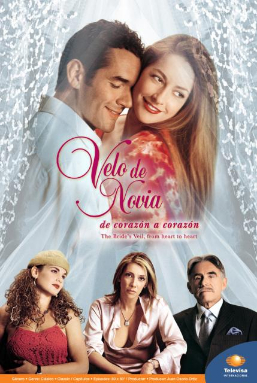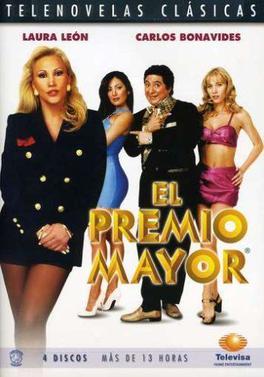Sólo Para Mujeres is a Mexican theatre play. It has been running for about a decade. This show was inspired by the 1997 British film Full Monty.

El derecho de nacer is a Mexican telenovela produced by Ernesto Alonso for Televisa in 1981. Based on the Cuban radionovela of the same name written by Félix B. Caignet adapted for TV by Fernanda Villeli and directed by Raúl Araiza.
Mi pequeña Soledad is a Mexican telenovela produced by Verónica Castro for Televisa in 1990.

Alborada is a Mexican telenovela produced by Carla Estrada for Televisa in 2005. It is a historical drama set in colonial Panama and Mexico a few years before the Mexican Independence from Spain.

Heridas de amor is a Mexican telenovela produced by Roberto Hernández for Televisa. It is a remake of the telenovela Valeria y Maximiliano. It premiered on April 3, 2006 and ended on September 22, 2006.

Las vías del amor is a Mexican telenovela produced by Emilio Larrosa for Televisa in 2002.

Inocente de Ti is a Mexican telenovela produced by Nathalie Lartilleux for Televisa in 2004.

La verdad oculta is a Mexican telenovela produced by Emilio Larrosa for Televisa in 2006.

Hasta que el dinero nos separe is a Mexican telenovela premiered on Canal de las Estrellas on June 29, 2009, and concluded on May 16, 2010. The series is created and produced for Televisa by Emilio Larrosa, based on the Colombian telenovela Hasta que la plata nos separe written by Fernando Gaitán. It stars Pedro Fernández and Itatí Cantoral as the titular characters.

Velo de novia is a Mexican telenovela produced by Juan Osorio for Televisa in 2003. It aired on Canal de las Estrellas from June 30, 2003 to January 2, 2004. The telenovela stars Susana González, Eduardo Santamarina, Héctor Suárez, Cynthia Klitbo, Marlene Favela and Blanca Guerra.

Mujeres engañadas is a Mexican telenovela produced by Emilio Larrosa for Televisa in 1999-2000. The telenovela tells the story of four couples who live in the same apartment building.

Qué bonito amor is a Mexican telenovela produced by Salvador Mejía Alexandre for Televisa that aired on Canal de las Estrellas from 22 October 2012, to 2 June 2013. It is based on La Hija del Mariachi, produced by Colombian's RCN Television and written by Mónica Agudelo in 2006–2007. Production of Qué bonito amor officially started on 9 August 2012. In the United States the telenovela aired on Univision from 15 April 2013 to 4 October 2013.

Laberintos de pasión is a Mexican telenovela produced by Ernesto Alonso for Televisa in 1999-2000. It aired on Canal de Las Estrellas from October 4, 1999 to January 21, 2000, weeknights at 8:00pm.

Amar otra vez(Loving again) is a Mexican telenovela produced by Lucero Suárez for Televisa in 2004. Starring Irán Castillo and Valentino Lanús with Rafael Amaya, Margarita Magaña, Roberto Ballesteros and Vanessa Guzman, in addition to its cast in Mexico's Sweetheart Angélica María as a suffering mother.
Locura de amor is a Mexican telenovela produced by Roberto Gómez Fernández for Televisa that premiered on May 1, 2000 and ended on October 6, 2000. The series is a remake of the 1988 telenovela Dulce Desafío. It stars Juan Soler and Adriana Nieto, Laisha Wilkins, Juan Peláez and Gabriela Platas.

El premio mayor, is a Mexican telenovela produced by Emilio Larrosa and written by Verónica Suárez and Alejandro Pohlenz.
Buscando el paraíso is a Mexican telenovela produced by Luis de Llano Macedo and Marco Flavio Cruz for Televisa in 1993.
Infierno en el paraíso is a Mexican telenovela produced by Carlos Sotomayor for Televisa in 1999.













